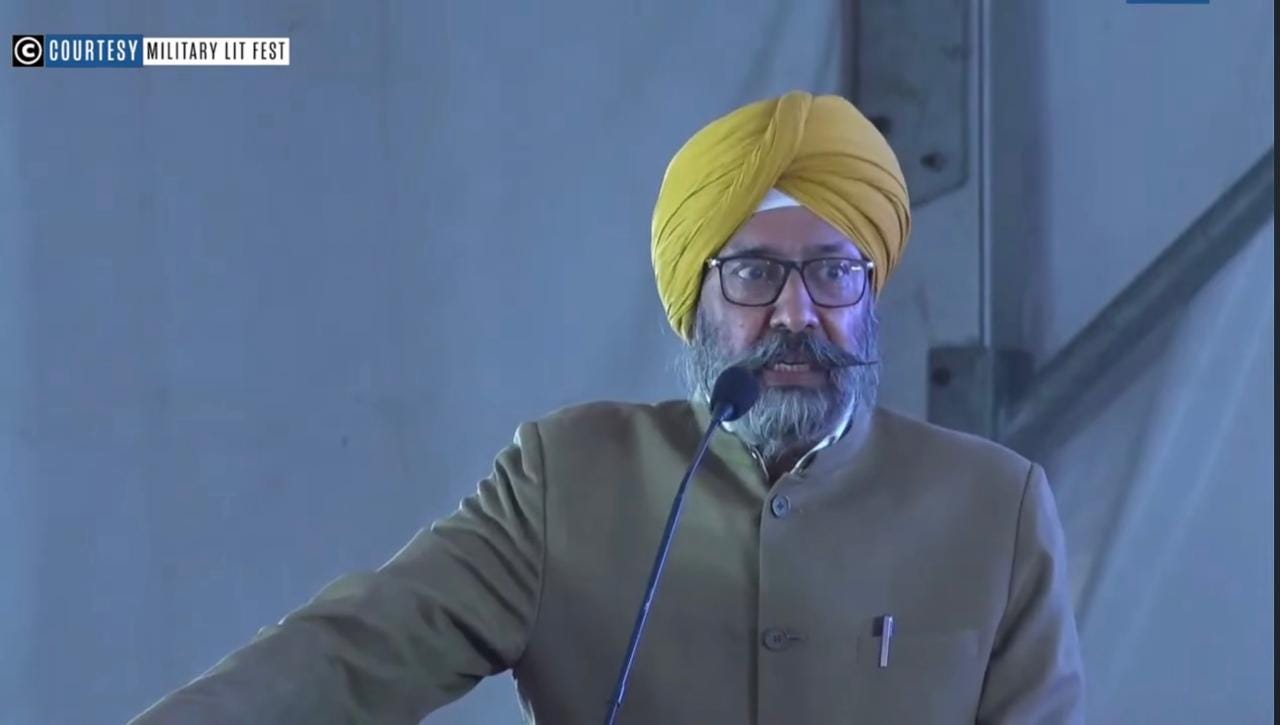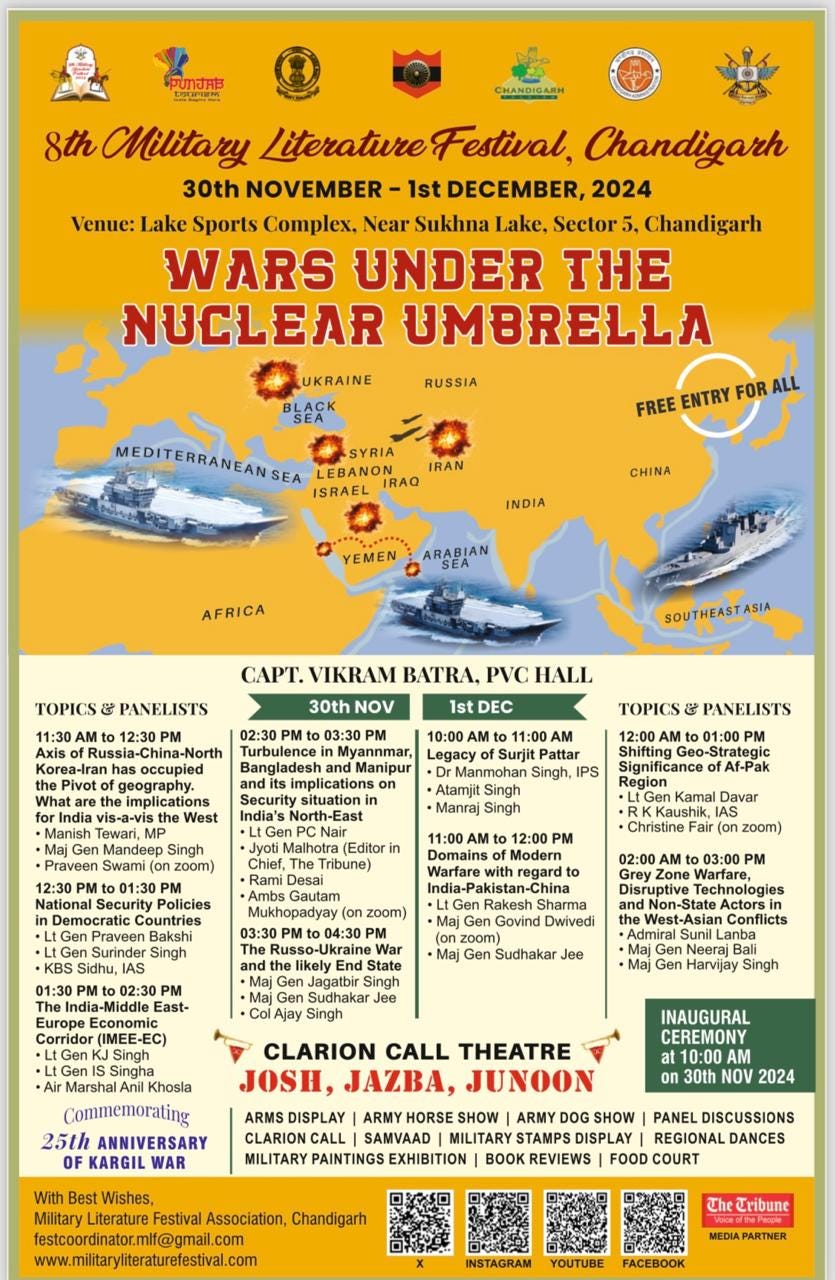KBS Sidhu (Video) @National Security Policies in a Democratic Polity
Livestreamed YouTube Video from the 8th Military Literature Festival, Chandigarh, 2024.
National Security Policies in Democratic Countries
On November 30, 2024, I had the privilege of participating as a panelist alongside two distinguished and highly decorated retired army generals, Lt. General Praveen Bakshi and Lt. General Surinder Singh, at the 8th Military Literature Festival in Chandigarh. The event, formally inaugurated by the Governor of Punjab, Shri Gulab Chand Kataria, served as a prestigious platform for thought-provoking discussions on national and global security challenges. Our panel delved into a topic of profound contemporary relevance: "National Security Policies in Democratic Countries."
(Click on video: It should automatically start at my 18- minute speech: else navigate to 2:50 hours
)
Speech Transcript Converted to Reported Speech with Pithy Paragraph Headings
Introduction and Context
The speaker began by acknowledging the audience and panelists at the Military Literature Festival. He remarked on how the session served as a continuation of earlier discussions, with Lt. General Surinder Singh having laid a strong foundation for the topic. The speaker emphasized the need to dissect the topic, “National Security Policies in Democratic Countries,” and questioned whether democracy, as practiced in India, acts as a constraint or strength in formulating robust national security policies.
Democracy and National Security: A Dichotomy
The speaker reflected on India's democratic framework, contrasting it with authoritarian regimes like China and Russia. He highlighted the Constitution’s emphasis on democracy and the oath taken by civil, military, and political officials to preserve it. The speaker noted that India lacks a publicly notified national security policy, partly to avoid revealing its strategies to adversaries. He clarified, however, that the Constitution’s commitment to unity and integrity indirectly forms the bedrock of India’s security framework.
Defining Policy, Strategy, and Doctrine
Elaborating on the conceptual distinctions, the speaker noted the hierarchy of policy, doctrine and strategy. He provided examples of how these levels operate in civil administration and military interventions, highlighting how national security transcends simple law and order issues, affecting the very survival and integrity of the Republic.
National Security Mechanisms: Historical and Legal Foundations
The speaker traced the evolution of India’s national security infrastructure, noting the establishment of the National Security Council post-1999, following incidents like the Kargil War and the Kandahar hijacking. He praised the robustness of Indian laws, citing Article 21 of the Constitution as a cornerstone that extends protection to all persons, even hostile aliens, not just the Indian citizens. He also discussed tools like the National Security Act, Unlawful Activities Prevention Act (UAPA), and the Disturbed Areas Act, arguing that these laws provide sufficient legal backing for maintaining national security.
Challenges of Siloed Functioning and Intelligence Coordination
The speaker highlighted the issue of poor coordination among government departments and intelligence agencies. He alluded to the perceived siloed functioning of organizations like R&AW, IB, and Military Intelligence, noting the lack of real-time information sharing. He emphasized the need for streamlined communication protocols and better inter-agency cooperation to address threats effectively.
Balancing Diplomatic and Intelligence Perspectives
The speaker identified a recurring divergence in perspectives between India’s diplomatic corps and intelligence agencies, particularly concerning relations with the USA and Russia. He highlighted the challenges of balancing energy security, historical alliances, and geopolitical realities while navigating pressures from global powers. He stressed the need for cohesive strategies guided by the National Security Council and National Security Advisor.
Emerging Threats: Cybersecurity, Cryptocurrencies, and AI
The speaker warned of non-traditional security threats like cyberattacks, emphasizing their potential to paralyze critical infrastructure. He called for cybersecurity to be integrated into every aspect of national security policy. He also discussed the role of cryptocurrencies in funding terrorism, advocating for a comprehensive regulatory framework. On artificial intelligence, he underscored its dual-use nature, both as a threat and a tool for enhancing national security capabilities.
The Multi-Disciplinary Nature of National Security
National security, the speaker argued, requires expertise from diverse disciplines beyond the military, including economics, technology, and diplomacy. He called for better collaboration among experts to create holistic policies, cautioning against overconfidence stemming from limited knowledge—a phenomenon he linked to the Dunning-Kruger effect.
International Collaborations and Strategic Partnerships
The speaker emphasized the importance of international partnerships like the Quad, while cautioning against over-reliance on any single alliance. He highlighted India’s pragmatic foreign policy, which balances relations with conflicting powers like the USA, Russia, and China, to safeguard national interests.
Public Support and National Security
The speaker acknowledged the unwavering support of Indian citizens for the state, particularly in Punjab, during crises and wars. He stressed the need to maintain this trust while engaging the public in security discussions without compromising sensitive information.
Conclusion: Strengthening India's National Security Framework
In conclusion, the speaker affirmed that India’s democratic system is not a hindrance but a strength in building a robust national security policy. He called for improved coordination, adoption of advanced technologies, and active engagement with global partners to ensure India’s security framework remains dynamic and effective.
The speech underscored the need for multi-disciplinary approaches, transparency, and adaptability in addressing the complex challenges of national security in a democratic framework.
In Summary
Democratic nations like India must navigate a delicate balance between security and liberty, collaboration and sovereignty, and innovation and ethics. By adopting a holistic, multi-disciplinary, and rights-based approach, we can craft national security policies that are not only robust but also reflective of our democratic values.
The panel discussion at the 8th Military Literature Festival provided a platform to explore these pressing issues, and I look forward to continued dialogue and action on these critical challenges1.
National Security Policies in a Democratic Polity
National Security Policies in Democratic Countries








Congratulations….!!🌹🌹🌹🌹